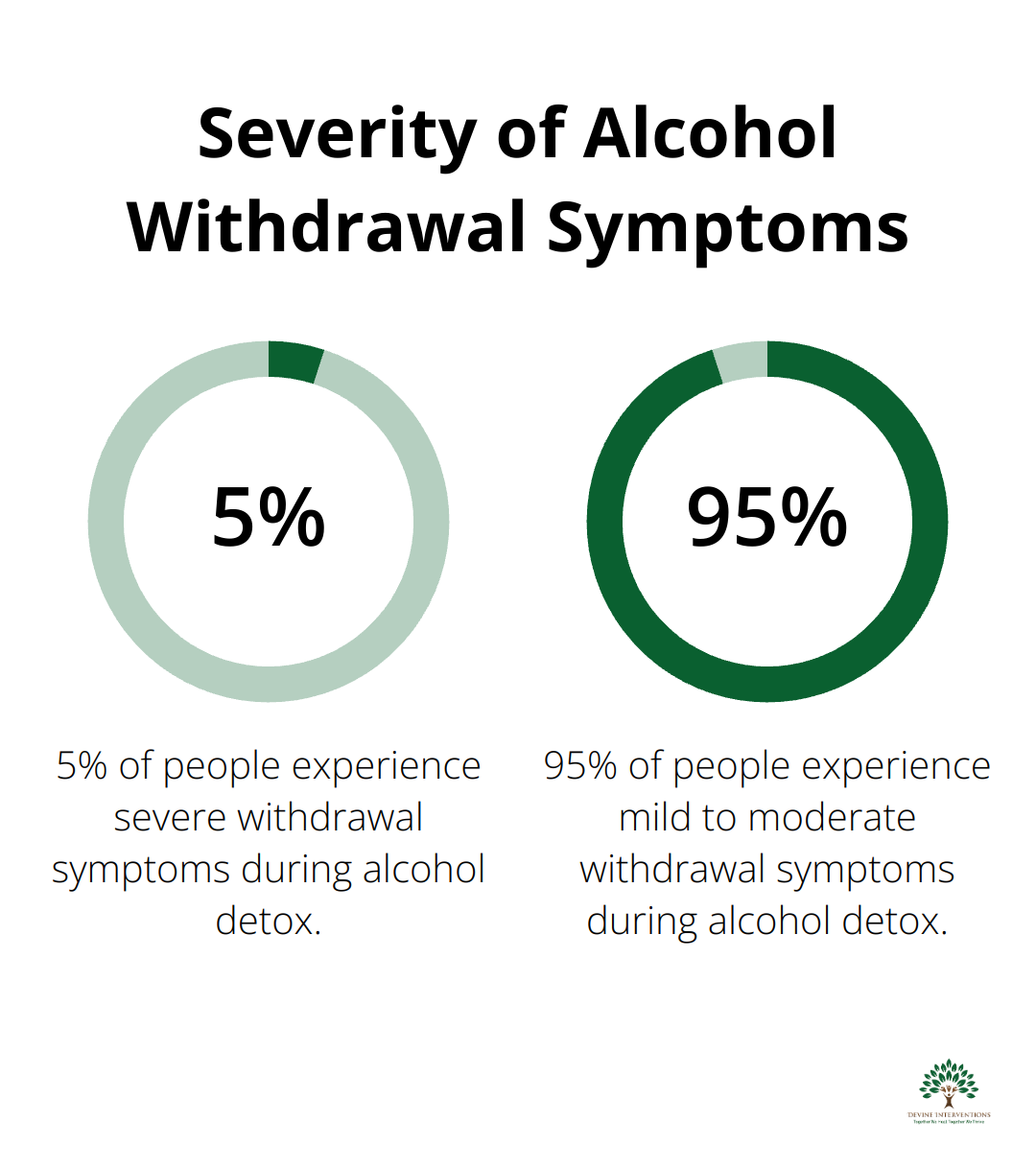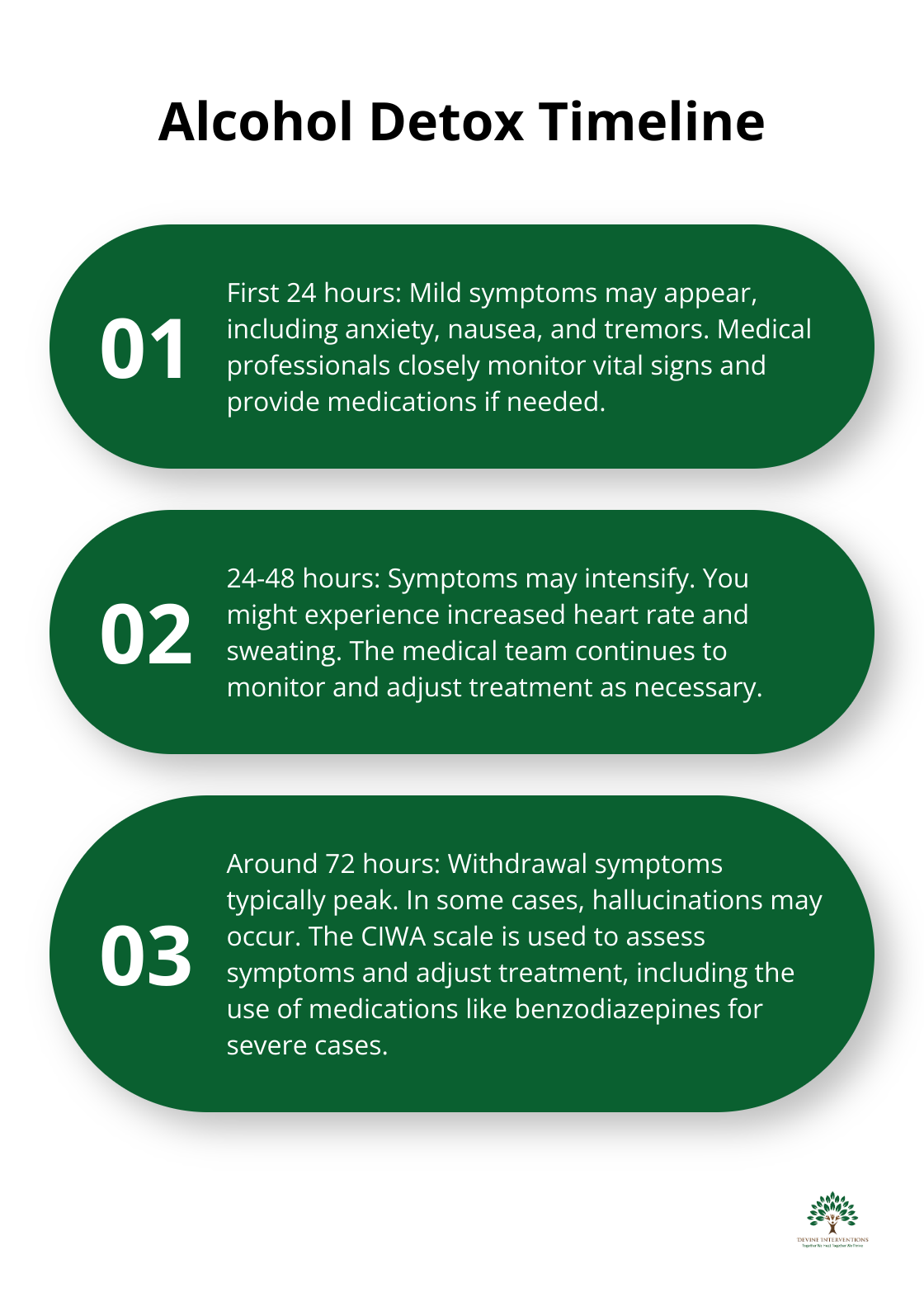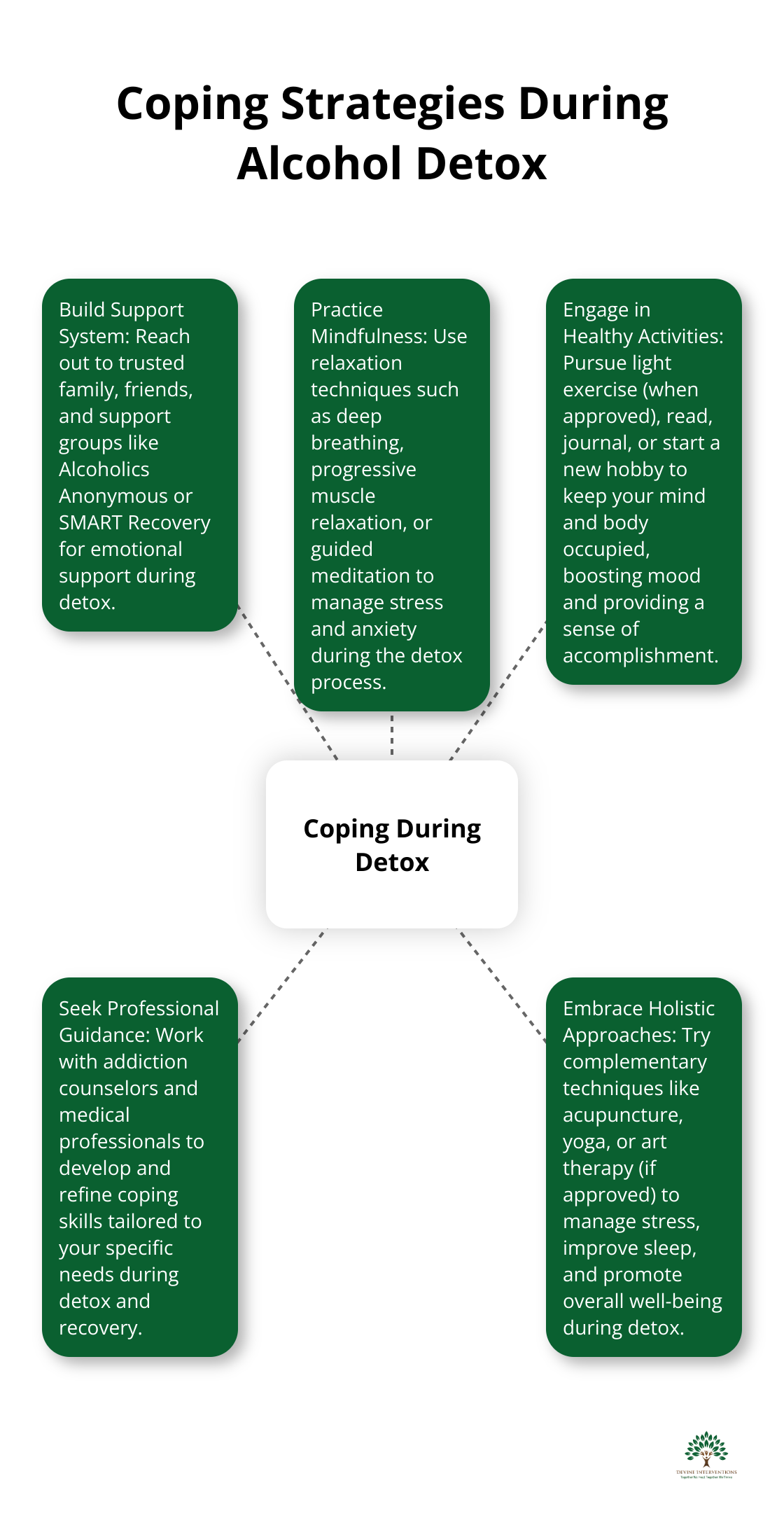At Devine Interventions, we know that starting an alcohol detox can be daunting. Many people feel uncertain about what to expect during this crucial first step towards recovery.
Our goal is to demystify the alcohol detox process and provide you with the information you need to feel confident and prepared. In this post, we’ll walk you through what to expect during a safe and supportive alcohol detox, from initial assessment to coping strategies and beyond.
What Happens During Alcohol Detox?
The First Step to Recovery
Alcohol detox marks the beginning of breaking free from alcohol addiction. We define it as the process of safely removing alcohol from your body while managing withdrawal symptoms. This phase typically lasts 5-7 days, though individual factors can affect the duration.
The Importance of Medical Supervision
Medical supervision during detox is essential. The National Institute on Alcohol Abuse and Alcoholism reports that about 5% of people experience severe withdrawal symptoms, which can threaten life. Professional care ensures your safety and comfort throughout the process.

Dispelling Common Myths
Many believe they can detox at home, but this approach carries significant risks. The American Society of Addiction Medicine warns that unsupervised detox can lead to severe complications. Benzodiazepines are considered the drugs of choice for managing all stages of alcohol withdrawal syndrome, including delirium tremens. Evidence-based methods effectively manage these risks in a controlled environment.
The Detox Timeline
During the first 24-48 hours, you might experience anxiety, nausea, and tremors. Medical professionals closely monitor vital signs and provide medications to ease these symptoms. As detox progresses, the focus shifts to hydration, nutrition, and rest to support your body’s healing process.
Addressing Psychological Aspects
Detox involves more than managing physical symptoms. The Substance Abuse and Mental Health Services Administration emphasizes the importance of addressing psychological aspects during this time. Therapy sessions help navigate the emotional challenges of early sobriety, setting the stage for long-term recovery.
At Devine Interventions, we understand the complexities of alcohol detox. Our comprehensive approach ensures you receive the support you need at every step. As we move forward, let’s explore the coping strategies that can make your detox experience more manageable and set you up for success in your recovery journey.
What Happens During Alcohol Detox?
At Devine Interventions, we understand that knowledge about the detox process empowers you to feel prepared and confident. Let’s explore what you can expect during your alcohol detox journey.
Your First Day
When you arrive at our facility, we start with a thorough assessment. This includes a physical exam, blood tests, and an in-depth discussion about your drinking history and overall health. We use this information to create a personalized detox plan tailored to your specific needs.
The first 24 hours can challenge you. You might experience mild symptoms like anxiety, nausea, or tremors. Our medical team monitors you closely and provides medication if needed to ease these symptoms.
The Next Few Days
As detox progresses, withdrawal symptoms typically peak around 72 hours after your last drink. During this time, you might experience more intense symptoms like increased heart rate, sweating, and in some cases, hallucinations.
Our team uses the Clinical Institute Withdrawal Assessment for Alcohol (CIWA) scale to regularly assess your symptoms and adjust your treatment accordingly. We may use medications like benzodiazepines to manage severe symptoms and prevent complications.

Focus on Nutrition and Hydration
Proper nutrition and hydration play a vital role in your recovery. Alcohol abuse often leads to vitamin deficiencies, particularly in B vitamins. We provide vitamin supplements, especially thiamine (Vitamin B1), to prevent serious complications.
You’ll receive balanced meals to help stabilize your blood sugar levels, which can fluctuate during withdrawal. Staying hydrated is essential, as dehydration can worsen withdrawal symptoms. We ensure you get enough fluids, sometimes through IV if necessary.
Beyond Physical Symptoms
While we prioritize managing physical symptoms, we also focus on your emotional and psychological well-being. You’ll have access to counseling and support groups to help you cope with the emotional challenges of early sobriety.
We believe in treating the whole person, not just the symptoms. Our comprehensive approach ensures you receive support physically, emotionally, and mentally throughout your detox journey.
Detox marks the first step in your recovery. As you progress, we work with you to develop a long-term treatment plan that addresses your unique needs and goals. The next phase of your journey involves learning effective coping strategies to maintain your progress and build a strong foundation for lasting recovery.
For some individuals, a partial hospitalization program may be recommended as a next step after detox, providing intensive support while allowing you to live at home. As you continue your recovery journey, outpatient services can offer ongoing support and help you maintain your progress in the long term.
How Can You Cope During Alcohol Detox?
Build Your Support System
A strong support network is essential during detox. Treatment options for alcohol use disorder include various approaches led by health care providers. Your network should include trusted family members, close friends, and support groups. We recommend you reach out to loved ones and consider joining groups like Alcoholics Anonymous or SMART Recovery.
Practice Mindfulness and Relaxation
Mindfulness and relaxation techniques can ease detox stress significantly. A recent study explored mindfulness-based interventions for alcohol dependence syndrome, recognizing its challenges for psychologists due to relapse and impacts on well-being. You should try deep breathing exercises, progressive muscle relaxation, or guided meditation apps (such as Headspace or Calm).
Engage in Healthy Activities
Keeping your mind and body occupied can help distract from cravings and discomfort. You should pursue light exercise (when approved by your medical team) to boost endorphins and improve mood. Reading, journaling, or starting a new hobby can provide a sense of accomplishment and fill time previously spent drinking. The key is to find activities you enjoy that don’t put undue stress on your body during this sensitive time.

Seek Professional Guidance
Professional support is invaluable during detox. At Devine Interventions, we provide a supportive environment where you can practice these coping strategies under expert guidance. Our team helps you develop and refine these skills, ensuring you have the tools for a successful detox and beyond. Addiction counseling can be a key step in your healing process.
Embrace Holistic Approaches
Holistic approaches can complement traditional detox methods. You should try techniques like acupuncture, yoga, or art therapy (if available and approved by your care team). These practices can help manage stress, improve sleep, and promote overall well-being during the detox process. For some individuals, an intensive outpatient program may be beneficial in addressing their substance use disorder.
Final Thoughts
Alcohol detox marks the beginning of recovery, presenting physical and emotional challenges. Professional care ensures safety and comfort throughout this intense but temporary phase. At Devine Interventions, we address both physical and psychological aspects of withdrawal using evidence-based practices.
Recovery continues beyond detox, building on the coping strategies learned during this initial stage. These skills (such as building support networks and practicing mindfulness) help maintain progress and build resilience. Our personalized approach to care fits your unique needs and goals as you move forward.
We at Devine Interventions support you through every phase of your journey to recovery. Our team guides you through the alcohol detox process and beyond, offering compassionate, professional care. A healthier, more fulfilling life awaits you.







